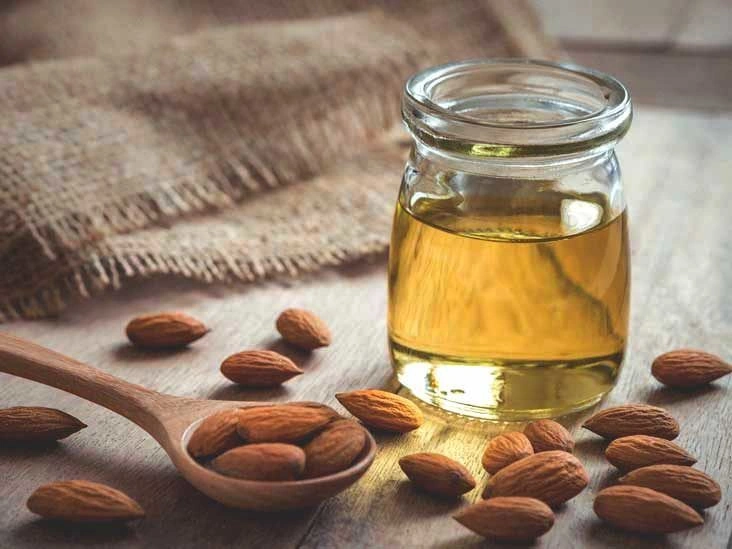Almonds are a filling snack with numerous possible health advantages.
The oil derived from these tasty tree nuts is often incorporated into natural skin and hair care routines, yet many people don’t realize it may also support overall health.
This piece explores how almond oil might be beneficial for wellbeing and how it can serve as a versatile, non-toxic beauty remedy.
:max_bytes(150000):strip_icc()/USED_Almond-Oil-for-Skin-3795-1x1-hires-164da0e34ff6495995ffbd905bd5672b-2d57508287ff402fbade2f82a0a2cade.jpg)
What Is Almond Oil?
Almonds are the edible seeds of the Prunus dulcis tree, commonly called the almond tree.
Although typically labeled as nuts, almonds are actually the seeds nestled inside the almond fruit, which resembles a small peach.
Almonds can be eaten whole, milled into flour or processed into non-dairy milk.
They are high in fat, making them an ideal source for oil extraction.
Sweet almonds are the type usually consumed and used to produce foods, oils and cosmetics.
By contrast, bitter almonds have been attributed medicinal uses but can be toxic if not correctly processed and are not commonly sold.
Refined vs Unrefined Almond Oil
Once harvested, almonds are hulled and dried before various extraction techniques are applied to obtain the oil.
Refined almond oil is produced using high-heat methods and chemical solvents.
This approach diminishes the oil’s nutritional profile, since many nutrients present in raw almond oil are destroyed by intense heat or chemical processing (1).
Although this yields a less nutrient-dense product, refined almond oil tolerates higher temperatures and is cheaper than unrefined varieties, making it a more economical option for many shoppers.
Unrefined almond oil is obtained by pressing raw almonds without using high heat or chemicals.
This gentler process preserves more of the oil’s nutrients, making unrefined almond oil preferable for culinary applications.
Summary Almond oil is derived from the almond seed. High-heat and chemical extraction methods reduce some nutrients, so unrefined almond oil is a superior option for cooking and finishing dishes.
Almond Oil Nutrition
While almond oil doesn’t contain all the nutrients of whole almonds, it still offers nutritional value.
Nutritional Breakdown
Here is the nutritional profile of 1 tablespoon (14 grams) of almond oil (2).
- Calories: 119
- Total fat: 13.5 grams
- Saturated fat: 1.1 grams
- Monounsaturated fat: 9.4 grams
- Polyunsaturated fat: 2.3 grams
- Vitamin E: 26% of the RDI
- Phytosterols: 35.9 mg
Almond oil is a notable source of vitamin E and supplies a small amount of vitamin K.
Many of the health effects associated with almond oil come from its abundance of healthy fats.
Fatty Acid Breakdown
These are the proportions of fatty acids present in almond oil:
- Monounsaturated fat: 70%
- Polyunsaturated fat: 20%
- Saturated fat: 10%
Diets high in unsaturated fats have been associated with various health benefits, such as a lower risk of heart disease and obesity.
Additionally, monounsaturated fats may help reduce high blood pressure, a contributor to cardiovascular disease.
Diets rich in monounsaturated fats have also been linked to a decreased risk of certain cancers, such as endometrial cancer, and they may assist with weight management.
Indeed, a recent review of 24 trials including 1,460 participants found that diets high in monounsaturated fats were more effective for weight loss than high-carbohydrate diets.
Summary Almond oil provides vitamin E and unsaturated fats. Diets abundant in unsaturated fats may offer health advantages, including reduced cardiovascular risk, lower obesity rates and support for weight loss.
Potential Health Benefits of Almond Oil
Whole almonds are believed to help reduce blood pressure and cholesterol and support weight loss, and almond oil may offer similar health effects.
Indeed, almond oil has been associated with a variety of possible benefits, including reduced cardiovascular risk and improved blood sugar control (10).
May Help Keep Your Heart Healthy
Almond oil is composed of about 70% monounsaturated fat, which has been investigated for cardiovascular effects.
Monounsaturated fats have been shown to elevate levels of “good” HDL cholesterol.
HDL is a protein-based particle that transports cholesterol away from artery walls to the liver for breakdown and elimination. Healthy HDL levels help guard against heart disease (13).
Both almonds and almond oil have also been found to reduce “bad” LDL cholesterol and total cholesterol.
Elevated LDL and total cholesterol are risk factors for cardiovascular disease, so lowering them can support heart health.
In one small trial, a diet high in almond oil significantly decreased LDL and total cholesterol while increasing HDL by 6% (15).
High in Antioxidants
Almond oil is an excellent source of the powerful antioxidant vitamin E.
One tablespoon (15 ml) provides about 26% of the recommended daily intake.
Vitamin E is a family of eight fat-soluble compounds with antioxidant capabilities.
These substances help shield cells from damage caused by free radicals.
Although free radicals are part of normal physiology, excessive amounts can harm tissues.
An overload of free radicals leads to oxidative stress, which has been implicated in several chronic conditions, including cancer and heart disease.
Research indicates that higher intakes of vitamin E may lower the risk of heart disease, age-related macular degeneration and cognitive decline in older adults.
May Be Beneficial for Blood Sugar Control
Incorporating almond oil into your meals may help stabilize blood glucose.
The oil is rich in monounsaturated and polyunsaturated fats, both shown to help reduce blood sugar in people with diabetes.
Replacing carbohydrates with unsaturated fats has been demonstrated to lower glucose levels and improve insulin sensitivity and HbA1c, a long-term blood sugar marker (21).
In one study, participants who had breakfast with added almond oil experienced lower post-meal and overall daily blood sugar compared with participants who did not consume almond oil.
Moreover, those who ate almond oil reported greater fullness after the meal, which led to reduced intake later in the day.
May Aid Weight Loss When Paired With a Reduced-Calorie Diet
Eating a diet that includes healthy fats can support weight loss.
Although many people avoid fats when trying to lose weight, the right kinds of fats may actually aid in shedding pounds.
Diets that include whole almonds have been shown to help people reduce excess weight, and adding almond oil may have similar benefits.
Diets high in monounsaturated and polyunsaturated fats have been linked to reductions in body fat and improved weight loss.
One study found that a diet rich in monounsaturated fats enhanced weight loss and body composition in obese women.
Another large study with 7,447 participants discovered that diets high in monounsaturated and polyunsaturated fats produced greater losses in body weight and abdominal fat than low-fat diets.
Summary Almond oil contains vitamin E and healthy unsaturated fats. Including almond oil in your diet may support heart health, assist weight management and help keep blood sugar levels steady.
Almond Oil Beauty Benefits
Almond oil is widely used in natural cosmetics. This gentle, calming oil benefits both skin and hair.
Part of its appeal comes from its emollient nature, meaning it helps reduce moisture loss from the skin.
This trait makes almond oil an excellent option to keep skin, hair and the scalp soft and hydrated.
The moisturizing properties of almond oil can be particularly helpful for those with dry or sensitive skin.
Almond oil is rich in vitamin E, which may help shield skin from sun damage and premature aging.
Animal research shows that topical vitamin E can help protect cells from UV damage by lessening DNA damage and other structural changes induced by sun exposure.
This underscores the benefit of using unrefined almond oil for skin, as it contains higher levels of vitamin E.
Additionally, this soothing oil might help reduce the spread of stretch marks.
One study involving 160 women found that applying sweet almond oil topically reduced the progression of abdominal stretch marks and eased redness and itching (28).
This multipurpose oil is a solid pick for those seeking natural beauty solutions with few ingredients and multiple uses.
It can serve as a gentle makeup remover, a natural skin or hair hydrator, or a smooth massage oil.
Summary Almond oil may help defend skin from sun damage and reduce stretch marks. It’s versatile—use it as a moisturizer, massage oil or makeup remover.
How to Use Almond Oil
Almond oil is a versatile product suitable for both culinary and personal care use.
In the Kitchen
Almond oil has a delicate, nutty flavor that complements many dishes.
Unrefined almond oil should not be exposed to high heat, since cooking temperatures can eliminate much of its nutritional value.
Instead, treat unrefined almond oil as a finishing oil and add it to foods after cooking.
Refined almond oil, however, has a higher smoke point—about 420°F (215°C)—and can be used for roasting and light sautéing.
Refined oil is less costly and more heat-stable than unrefined oil because the refining process removes many heat-sensitive nutrients.
Here are a few ways to use unrefined almond oil:
- As a flavorful salad dressing: Mix unrefined almond oil with apple cider vinegar and fresh herbs.
- To add nutty notes to dishes: Drizzle almond oil over sides for extra flavor.
- Over pasta: Stir a little almond oil into pasta to boost healthy fat content.
As Part of Your Beauty Routine
If you want to replace some commercial skin and hair care products with more natural, non-toxic alternatives, almond oil is an excellent option.
Almond oil is typically cheaper than many store-bought moisturizers and doesn’t contain harmful additives.
It’s a multipurpose beauty staple suitable for both hair and skin applications.
Below are some ways to incorporate almond oil into your care routine.
- As a moisturizer: Almond oil is an ideal gentle moisturizer for sensitive skin.
- Apply to very dry areas: Rub almond oil on elbows, feet and other spots prone to dryness.
- To make a homemade hair mask: Combine almond oil with mashed avocado and smooth onto damp hair for deep hydration.
- Mix with essential oils: Use almond oil as a carrier oil to dilute essential oils before topical application.
Summary Use unrefined almond oil as a finishing oil in the kitchen—don’t heat it. You can also use almond oil cosmetically as a skin and hair moisturizer.
The Bottom Line
Almond oil is a versatile fat suitable for culinary and beauty uses.
It may support heart health, stabilize blood sugar, protect against oxidative damage and help maintain a healthy weight.
Additionally, almond oil is an excellent skin and hair moisturizer and may help reduce stretch marks and guard skin against sun damage.
Unrefined almond oil preserves more nutrients than refined oil and is preferable for culinary finishing use—just avoid heating it to retain its benefits.
Whether placed on your pantry shelf or your vanity, almond oil is a valuable, multipurpose addition.
























Leave a Reply
You must be logged in to post a comment.